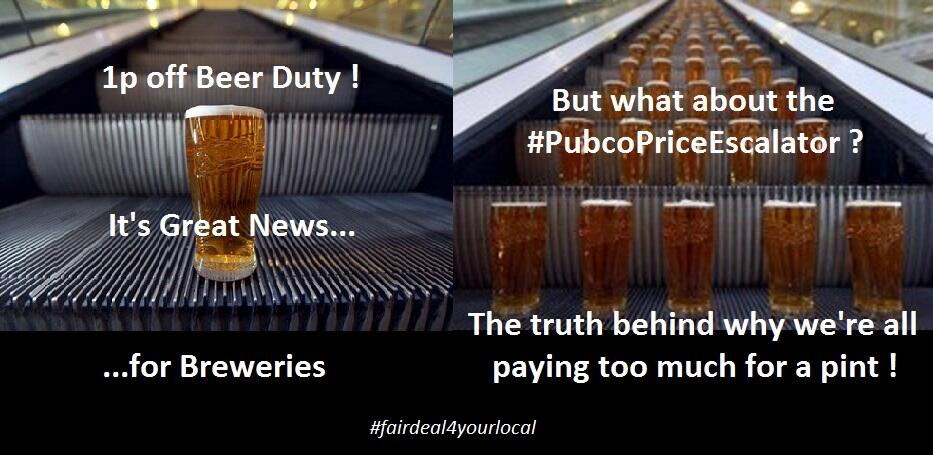Despite strenuous efforts, I have yet to find a publican who
has lopped off 1p from the price of a pint of beer following George Osborne’s
announcement in the budget last week.
This is surely strange; after all, coalition ministers have
been shouting quite a lot about this. Grant Shapps, in the poster of his now
infamous tweet, boasted that ‘Cutting the Bingo Tax & Beer duty’ was
helping ‘hardworking people do more of the things they enjoy’. And Conservative
MP Andrew Griffiths – who represents, some believe with painful irony, Burton, the home of British brewing – has been
especially excited, proclaiming the cut proves ‘this is the most beer and
pub-friendly government we have seen in a generation’.
Mr Griffiths wrote effervescently about what the chancellor
had done in the Publicans’ Morning Advertiser:
‘Last year’s decision to cut a penny off the price of a pint
of beer was the first such decision by a chancellor since 1959. Yet it was the
decision to scrap Labour’s hated beer-duty escalator that really made the
difference to the industry.
‘Ending the year on year ratcheting up of a beer duty, a
system which saw it rocket 48% between 2008 and 2012, ended the misery of a
system which was bleeding the beer industry dry.
‘The more optimistic of us hoped and campaigned for a freeze
in this year’s Budget, but not many expected an historic successive second cut.
This of course was followed by scrapping of the alcohol duty escalator, and freezes
for Scottish whisky and real cider.
'All in all, this was a beer and pub budget that the whole
industry should be thrilled with.’
And Mr Griffiths hasn't held back on Twitter either.
And here he is below, clearly exemplifying responsible drinking:
Now let's not be churlish. It is of course welcome that the government has felt able to make any cut in the price of a pint of beer, especially as drinkers are increasingly lucky to get change from a fiver when buying a pint in the capital these days.
But for anyone to suggest this is the great rescue of the pub trade is, frankly, not taking the issue seriously.
Recent figures from CAMRA suggested the number of pubs closing each week had risen to 28 per week and while many in the pub trade are pleased with the price cut, they have wasted no time in pointing out the government's inaction - despite repeated promises - in tackling pubco reform - offering tenants a chance for a fair rent and an end to the system which sees them hit by high rent costs and high beer costs. Posters such as the one below have quickly appeared:
Simply nothing has happened. There has been no response to the government's consultation on the issue (for more on this delay see here) and it seems likely such reform has been blocked at a high cabinet level and nothing will happen this side of an election. It's worth noting Andrew Griffiths, a self-styled champion of pubs, is curiously opposed to any such reform.
And, in a timely fashion, the latest figure to get involved in the issue is the not insubstantial figure of Tim Martin, the founder of the Wetherspoon's chain. In his company magazine, he writes: 'The main additional reason for pub distress is the high level of debt assumed by some pub companies in the years running up to the credit crunch.' And he names financiers Guy Hands and Hugh Osmond of being the architects of this 'unsustainable', damaging model.
'In essence, Hands and Osmond bought large tenanted pub estates of the major brewers, using borrowed money, and then hiked up the rents and the beer prices paid by the tenants. As a result of the increased income which they generated, they were able, in effect, to remortgage pubs, extracting tens of millions of "profit" for themselves.'
Companies like Enterprise Inns and Punch Taverns were the successors to this and they continued using the same model. Tim Martin goes on:
'When the individual licensees/tenants started to suffer between the hammer of high rents and beer prices and the anvil of tax-subsidised supermarkets, unprecedented numbers of publicans went bankrupt - and the Enterprise and Punch shares plummeted on the stock market to a fraction of their former value.'
And while pub titans old and new, such as Hands, Osmond and Enterprise's former chief Ted Tuppen have showed little sympathy to the 'plight of the tenants', they have been vociferous in their complaints about high personal taxes, specifically Labour's plan to increase the top rate of income tax back up to 50 per cent should they regain power. He concludes, with restrained fury:
'There is a justifiable argument for a reasonable top rate of tax which encourages hard work - Britain did not benefit from the Rolling Stones hiding from the taxman in the south of France in the 1970s. However the disregard of the financial engineers for the plight of their tenants and their egocentric concentration on their own positions, dressed up as national concern, might even have caused Maggie Thatcher to side with Ed Balls.'
So while the government tinkers around the margins, fiddling ineffectively with beer prices, it continues to ignore the hugely damaging pubco model, something which all, but the most stubborn, now recognise needs tackling with urgency. Until the government belatedly takes action, their claims of being the publican's - and the beer drinker's - friend will largely fall on sceptical and deaf ears.
Tim Martin's full article can be read here.



No comments:
Post a Comment
The comments expressed do not necessarily represent the views of the blog.